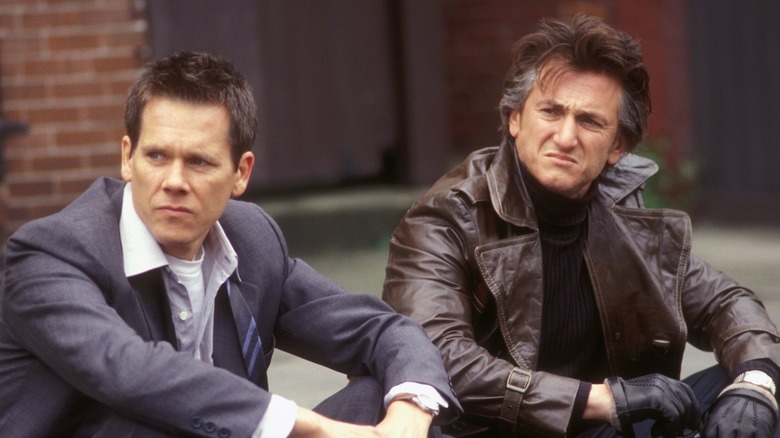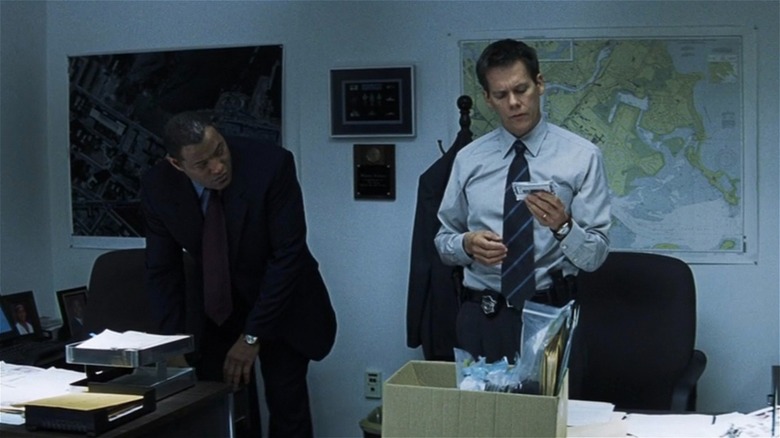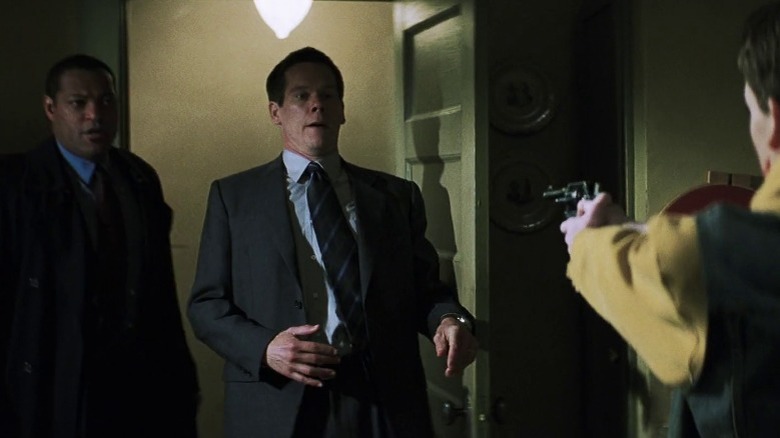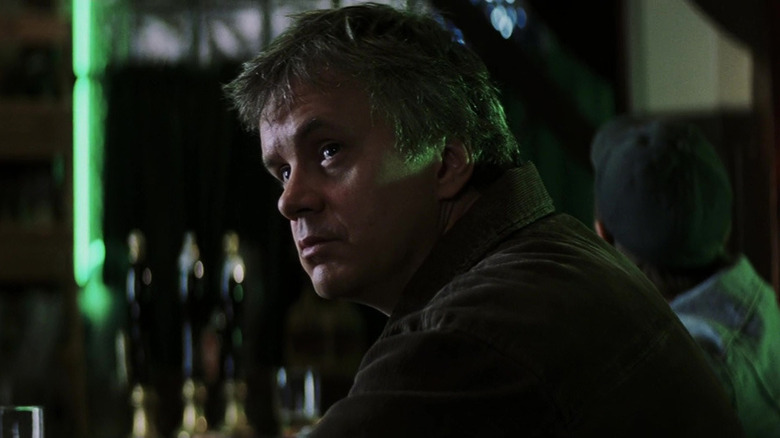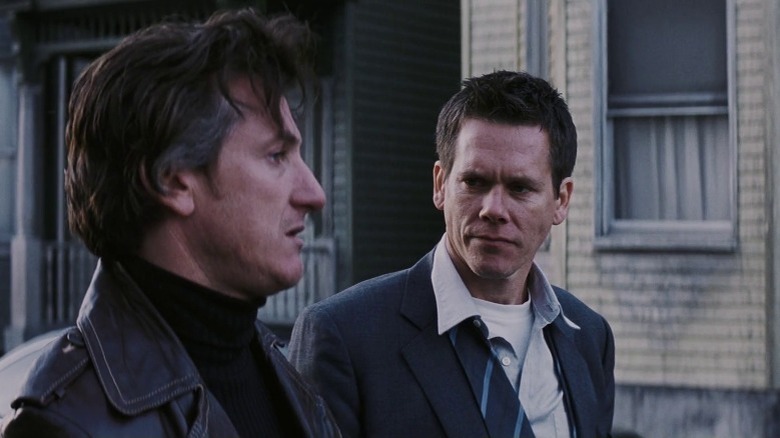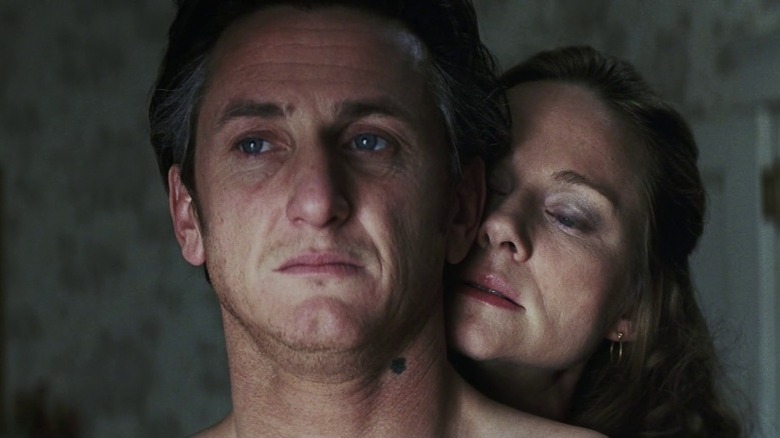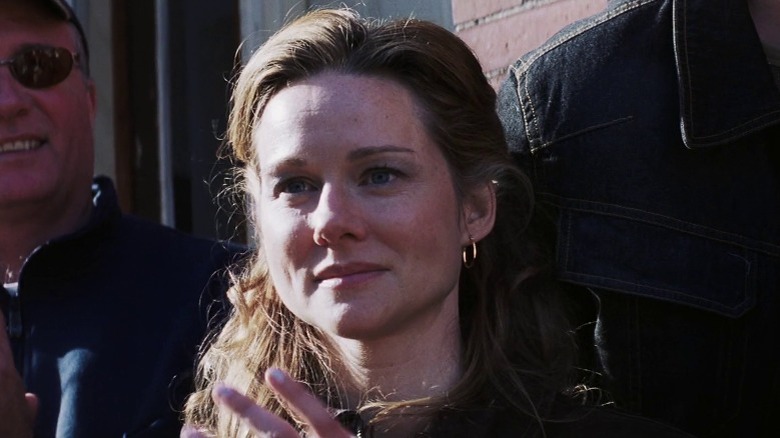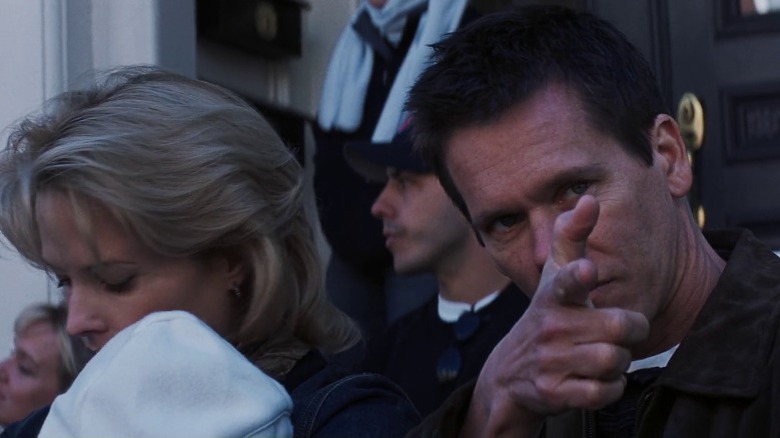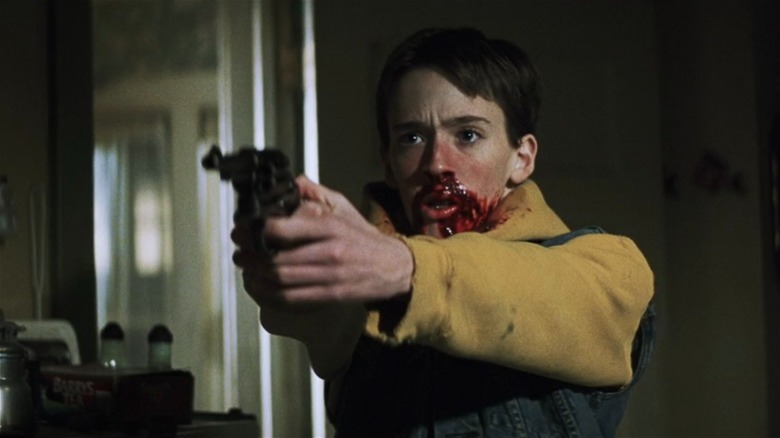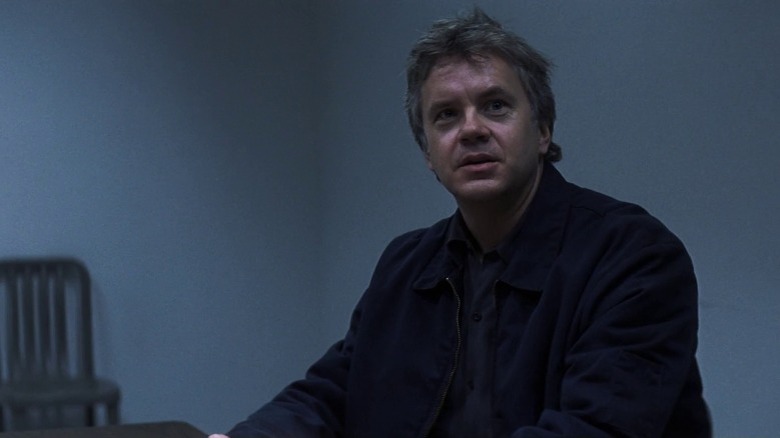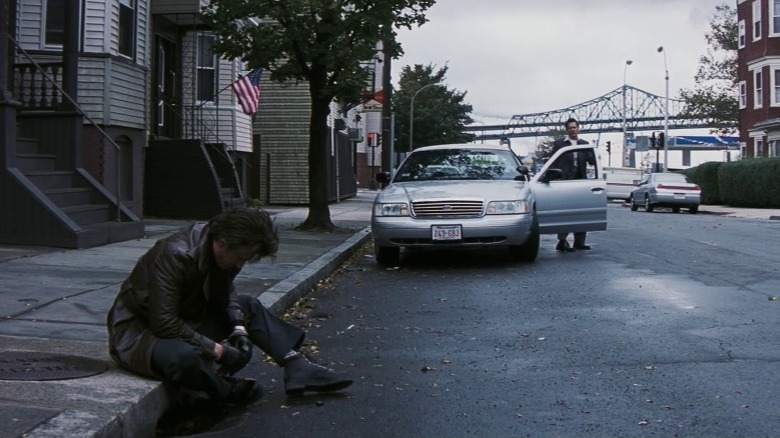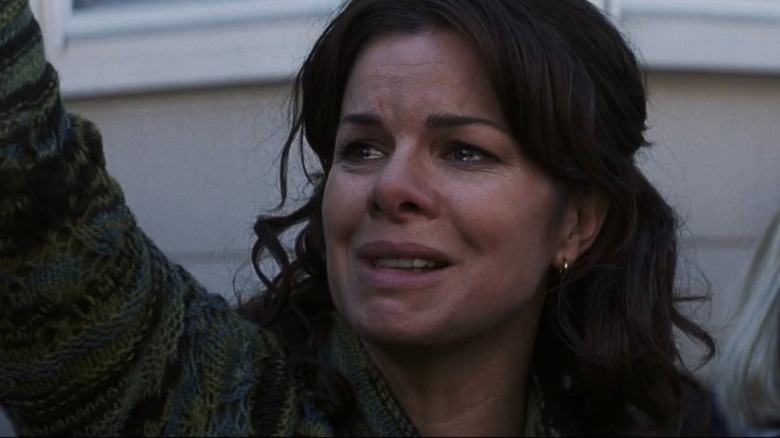The Ending Of Mystic River Explained
Directed by Clint Eastwood from a screenplay by Brian Helgeland, "Mystic River" is one of the most acclaimed film adaptations of a novel by American mystery author Dennis Lehane, whose tightly woven social and psychological tapestries have become a subgenre unto themselves in both literature and cinema. Not to mention, the movie can be considered one of the best mystery films ever.
Released in 2003, the somber neo-noir drama became notable as the fourth film in history and the first since 1959's "Ben-Hur" to win the Academy Awards for best actor and best supporting actor alike. It was the first Oscar given to both Sean Penn and Tim Robbins, who won, respectively, for their portrayals of a hard-edged Bostonian paterfamilias mourning the death of his eldest daughter, and a family man haunted by his brutal molestation as a child.
Although Penn and Robbins' characters get a lot of the film's focus, "Mystic River" is an ensemble piece with several threads — from crime procedural to psychological study to community portrait — brought together into an expansive story of grief, pain, hate, violence, and uncertainty. The ending of the film, in which the violence finally comes to a boil with gut-wrenching consequences, is among the most tragic in all of this century's American studio cinema — and leaves viewers with as many lingering questions as it does fascinating thematic insights. Here's an analysis of the ending of "Mystic River" and what it all means.
What you need to remember about the plot of Mystic River
"Mystic River" follows the adult lives of three childhood friends from Boston: Jimmy Markum (Sean Penn, in one of his best roles), Dave Boyle (Timm Robbins), and Sean Devine (Kevin Bacon). Decades after their lives were rocked by a horrific incident — Dave was abducted by two child molesters in front of his friends, and then sexually abused for days — the three men are brought together again by yet another tragedy when Jimmy's 19-year-old daughter Katie (Emmy Rossum) is found dead in a park.
While Sean, now a Massachusetts State Police detective, investigates the murder along with his partner Whitey Powers (Laurence Fishburne), Jimmy conducts a parallel investigation aided by two heavies from his criminal days, in hopes that finding and killing Katie's murderer will help him deal with his grief. The state police soon close in on the family of Brendan Harris (Tom Guiry of "The Sandlot" fame), Katie's boyfriend with whom she intended to elope. Though Brendan is ruled out as a suspect, the tense history between his family and the Markums comes to light.
Meanwhile, Dave is met with increasing suspicion from his wife Celeste (Marcia Gay Harden) because he arrived home covered in someone else's blood the night of Katie's death. Dave insists that he merely got into a fight with a mugger that got out of hand, but nothing about such a fight has been published in the papers, and Dave's behavior grows frazzled and erratic as the investigation trods along.
What happens at the end of the film?
Eventually, fearing for her safety, Celeste temporarily relocates to a motel with her and Dave's son Michael (Cayden Boyd). She then approaches Jimmy, expressing her belief that Dave is Katie's killer. Sean and Whitey diverge, with Whitey strongly suspecting Dave while Sean insists they follow the trail of the murder weapon — a revolver found to have once belonged to Brendan's long-missing father.
Jimmy and his henchmen bring Dave to a riverside bar, and Jimmy questions him. During the confrontation, it's revealed that Jimmy killed Brendan's father, "Just Ray" Harris, decades prior, as retaliation for Ray's part in his arrest — and then dumped Ray's body in the Mystic River. Dave admits that he did kill someone, a man he found assaulting a teenage boy, on the night of Katie's death. Jimmy doesn't believe him and pleads with Dave to confess to Katie's murder, promising to spare his life in return. Dave finally confesses, and Jimmy kills him.
Brandon finds his father's gun missing and realizes his teenage brother "Silent Ray" (Spencer Treat Clark) and his friend John O'Shea (Andrew Mackin) are responsible for Katie's death. They get into a violent tussle that is interrupted by Sean and Whitey's arrival; the detectives arrest Silent Ray and John, who confess to having killed Katie in a botched prank. Celeste reports Dave as missing, and Sean infers that Jimmy murdered him, but takes no immediate action. The film concludes with them exchanging somber glances during a street parade.
Why did Dave say he killed Katie?
One of the most puzzling aspects of the film's intense ending is the question of why Dave, despite his innocence, would not only confess to murdering Katie but do it in such a convincing way, going so far as to give a credible reason for why he supposedly "killed" her.
On the most basic level, it's easy to surmise that he does it simply because he's afraid of Jimmy and buys into his deceitful threat. Jimmy, convinced of Dave's guilt by Dave's ever-changing recollections of the past, assures him that he'd be fine with him atoning for his "actions" by serving prison time instead of dying. It was all that Dave, already in a catastrophic mental state by that point, needed to hear to slip away from good judgment and cave into Jimmy's demand.
But what, then, are we to make of Dave's declaration that he envied Katie's youth because he never got to have a youth of his own? Certainly, there could be some kernel of truth in that statement. Dave might've simply thrown in an unrelated personal anecdote to make the confession seem more convincing, worried that Jimmy wouldn't believe it otherwise. Or maybe it was just Dave's mental disarray talking — after all, at the moment of his "confession," he was an untreated mentally ill man going through the most stressful situation imaginable. The real question, of course, is why Jimmy believed him.
Why doesn't Sean arrest Jimmy if he knows he killed Dave?
One of the final scenes in "Mystic River" is the conversation between Jimmy and Sean in which Sean reveals that Katie's killers have been caught. It takes place the morning after Dave's murder, and even before Sean breaks the big news, he's already suspicious of Jimmy, who seems wracked with guilt and anxiety. Sean asks Jimmy where he last saw Dave and what he did the night before, and Jimmy gives him a series of evasive answers before thanking him for catching Katie's killers. Sean understands what happened when Jimmy laments, "If only you'd been a little faster." He sarcastically asks Jimmy if he also intends to send Celeste $500 a month as he has done for Brendan Harris for years — thus confirming that Sean has figured it all out.
Yet he can't prove any of it. Proving would require Dave's body to be found after getting dumped in the Mystic River, for starters, and it might never be found; Just Ray's body never was. The same goes for the murder weapon. Jimmy's henchmen are too loyal to rat him out, and there are no other witnesses. And nothing that Jimmy said or refrained from saying technically constitutes a confession. Sean doesn't arrest Jimmy because he can't; to even have the possibility of arresting him would require a massive amount of work that he may or may not be willing to put in.
What is the meaning of Annabeth's ending speech?
In the film's second-to-last scene, Jimmy is standing quietly in a corner of his bedroom, consumed by guilt over what has happened. It's then that his wife Annabeth (Laura Linney) enters the room and delivers an unexpected, shockingly cold-blooded speech that reconfigures the audience's entire notion of her, Jimmy, their marriage, and the film's themes.
Unfazed by the news that her husband killed an innocent man, the ever-proper Annabeth convinces him that all he did was in the name of protecting his family, and therefore unquestionable. She's told their two young daughters that Jimmy is a king who will do anything to keep them safe, and insists to Jimmy that, while everyone else in the world may be weak, they are strong, and that is their virtue.
This speech, which is followed by a passionate kiss and the implication of sex, drives home the theme of violence as a tool of power and power as the great moral imperative of American society, with the nuclear family unit as a practical apparatus in service of that imperative. While Annabeth's words may seem jarring, they're part and parcel with her effort to uphold all of her community's norms. They are, in fact, an expression of the logic that has been underlying all of Jimmy's actions throughout the film: He wanted to find and kill Katie's killer himself because to merely leave him to the state's custody would be to give up power over his turf.
Annabeth and Celeste epitomize the film's central thematic conflict
In Annabeth's climactic speech to Jimmy, she also mentions Celeste and brings up the way that she smeared Dave's reputation by venting about her suspicions of him to others. Annabeth is appalled and disgusted that Celeste could have done such a thing, finding it to be a betrayal of her duties to her husband; in her worldview, it's a more unforgivable sin than Jimmy's murder of Dave.
In fact, to hear Annabeth tell it, it's almost like Celeste is more responsible for Dave's death than Jimmy himself. This is the logical consequence of the ascetic, nuclear-family-only individualism the Markums live by. The truth of who killed who, who hurt who, and who broke what law doesn't matter: Just as it's not Annabeth's place to judge Jimmy, it wasn't Celeste's place to cast doubt on her husband's innocence. The moment that she did, she was allowing Jimmy to deal with him as per (what he believed to be) his own familial interest. Morality, in this framework, is not about finding the overarching societal truth; it's about protecting the family, especially the patriarch's power standing, no matter what.
This is why, at the very end, Annabeth remains tranquil, empowered, and composed, while Celeste is left alone and in shambles. The former understands how things work in her community, while the latter doesn't; she thought that she could trust other people beyond her immediate nucleus, that there was more to her world than interfamilial sparring.
It's up to the viewer to interpret what Sean's final gesture means
The final and most enigmatic interaction between Jimmy and Sean occurs during the final parade scene, when Sean — now reunited with his wife (Tori Davis) and child, his own family unit restored — locks eyes with Jimmy from a distance and makes a finger gun at him. Jimmy responds by raising his hands in a perpendicular position, in a gesture ambiguously caught between "You got me there" and "What can you do?"
That's the last we see of either character, and, ever since the film was released, that ending has raised questions about whether Sean intends to go after Jimmy and bring him down for Dave's murder or is merely signaling to him that they both now share the knowledge of what happened and will keep it between them. Sean's family returning complicates matters — will he now be content with keeping to his "turf" and not intruding on Jimmy's because he got his life back, or will his newly-restored patriarch status gas him up for war? We don't know anything about his wife, so we can't infer what he means by admitting he pushed her away.
Ultimately, the takeaway from that moment is necessarily ambiguous — something Clint Eastwood himself noted in a 2005 Film Comment interview, arguing that "Whatever you think it is, is right." There's no set truth about the meaning of Sean's gesture; interpreting it as threat or treaty is up to the viewer.
The ending is a parable about how violence never exhausts itself
The sense of incompletion and openness that hangs over the ending of "Mystic River" is very much intentional, but it goes beyond the simple lack of plot resolution. As viewers, we're made to leave the film with a feeling of unshakable unease because, consciously or subconsciously, we understand the tragic subtext: The violence does not, cannot, and will not end there.
Even on the off chance that Sean does not go to war with Jimmy and refrains from trying to prove his guilt, their potential conflict isn't the only fuse threatening to go off. For one thing, the feud between the Markums and the Harrises remains, and there's no telling what kind of path Silent Ray will be sent on following his arrest, nor what Jimmy will do with the information that his daughter's killers are still alive. For another, little Michael Boyle will grow up knowing his father was murdered and that Jimmy is probably the culprit, in a culture that encourages taking such matters into one's own hands.
This is the toll of violence as a means of moral enforcement: It begets more violence and balance can never be reached. It's also, by the same token, the tragedy of violence as a cascading material fact: Much of the ruckus can be traced back to the day young Dave got in that car. To some extent, the violence of his kidnappers still reverberates over the whole community, ever less perceptible, ever more pervasive.
The film's unspoken horror lies in Dave's abandonment
"Violence keeps reverberating for decades and across communities" would be a pretty despondent, even nihilistic message if it weren't paired with the film's other, equally crucial theme: The indictment of how, in communities like Jimmy's, there are no tools available for dealing with the isolation and mental disarray spurred by abuse.
In the end, the whole story of "Mystic River" is about Dave and how his trauma pulls him away from life's enforced normalcy, casting him into a new reality he can't comprehend or face except by shutting himself off from it. As Annabeth says, their world favors the strong, and Dave doesn't have the option of being strong; more to the point, being strong is not what he needs. Dave needs help — but no one is interested. He needs mental health support that allows him to face and cope with the reality of his circumstances. He needs to be seen in — and to look at — his own real, vulnerable self, unencumbered by the norms of his patriarchal role. But this is a world in which even Jimmy is pestered by his father-in-law (Kevin Conway) to not let his grief get in the way of his family man duties, and so Dave never stands a chance. All he can do is enact a psychodrama of revenge for his younger self, and even that he has to keep a secret.
In this film, evil does not exist — at least not the way we think it does
To process the weight of what befell Dave, his acquaintances interpret the abduction and sexual abuse as an act of evil — a demonstration of pure, primal wickedness too great to comprehend. Dave himself internalizes that interpretation, describing child molesters as vampires and speaking of his trauma in metaphysical terms, as though he had died that day and been doomed to roam the Earth as a living dead. That bedrock of hushed dread — the idea of evil — underlies all the drama of "Mystic River."
But the core tragedy of "Mystic River" doesn't lie in the contemplation of evil, exactly. Instead, the film's truly stinging conclusion is that "evil," such as it is, is merely a concept invented by humans to make sense of a chaotic and painful world. Horrible things happen, but they're not ineffable phenomena; they're actions taken by people. Understanding and processing them in such materialist terms is much more difficult than chalking them up to a primal essence of destruction.
It's precisely the idea of "evil" as an appreciable organizational force in society that ultimately legitimizes and engenders more destruction, more violence, and more pain. Men like Sean and Jimmy endeavor to fight evil because they cannot bear to fight the emotional anguish eating them from the inside; in the process, they abandon men like Dave, who throw themselves into their own fights that never resolve into peace.
The tragedy of Celeste lingers long past the closing credits
The tragic irony of the "Mystic River" finale is that, while Celeste precipitated it by misunderstanding Dave and denouncing him to Jimmy, she's ultimately just as much a victim of her community's neglect as her husband — and has now been doomed to feel what her husband had been feeling all along. Although we never get an extensive background on Celeste, it's clear from her actions and from Marcia Gay Harden's performance that she's also mentally unwell and in desperate need of help and support. And that's even before she becomes a widow, one destined to be looked down on as the wife who betrayed her turf.
"Mystic River" ends with Celeste scurrying through the background of the parade, calling out to her son, invisible to the community. Dave never got a fair chance to explain himself, and neither will she: The friends and relatives she thought she could trust will turn their backs on her, abandon her and her son to their own devices, and even taunt her with their comparative well-being. No one's interested in stopping the cycle. Sean might try to give her justice, but even if he does, she'll be a collateral concern in a war between two functioning patriarchs. Everyone's sins will be washed clean if they have the power to make use of the river, but Celeste's sins will shadow her, sap her of life, leave only pain, and make her a shell. And nobody will bat an eye.
If you or anyone you know needs help with mental health, may be the victim of child abuse, or has been a victim of sexual assault, contact the relevant resources below:
-
The Crisis Text Line by texting HOME to 741741, call the National Alliance on Mental Illness helpline at 1-800-950-NAMI (6264), or visit the National Institute of Mental Health website.
-
The Childhelp National Child Abuse Hotline at 1-800-4-A-Child (1-800-422-4453) or contact their live chat services.
-
The Rape, Abuse & Incest National Network website or contact RAINN's National Helpline at 1-800-656-HOPE (4673).
